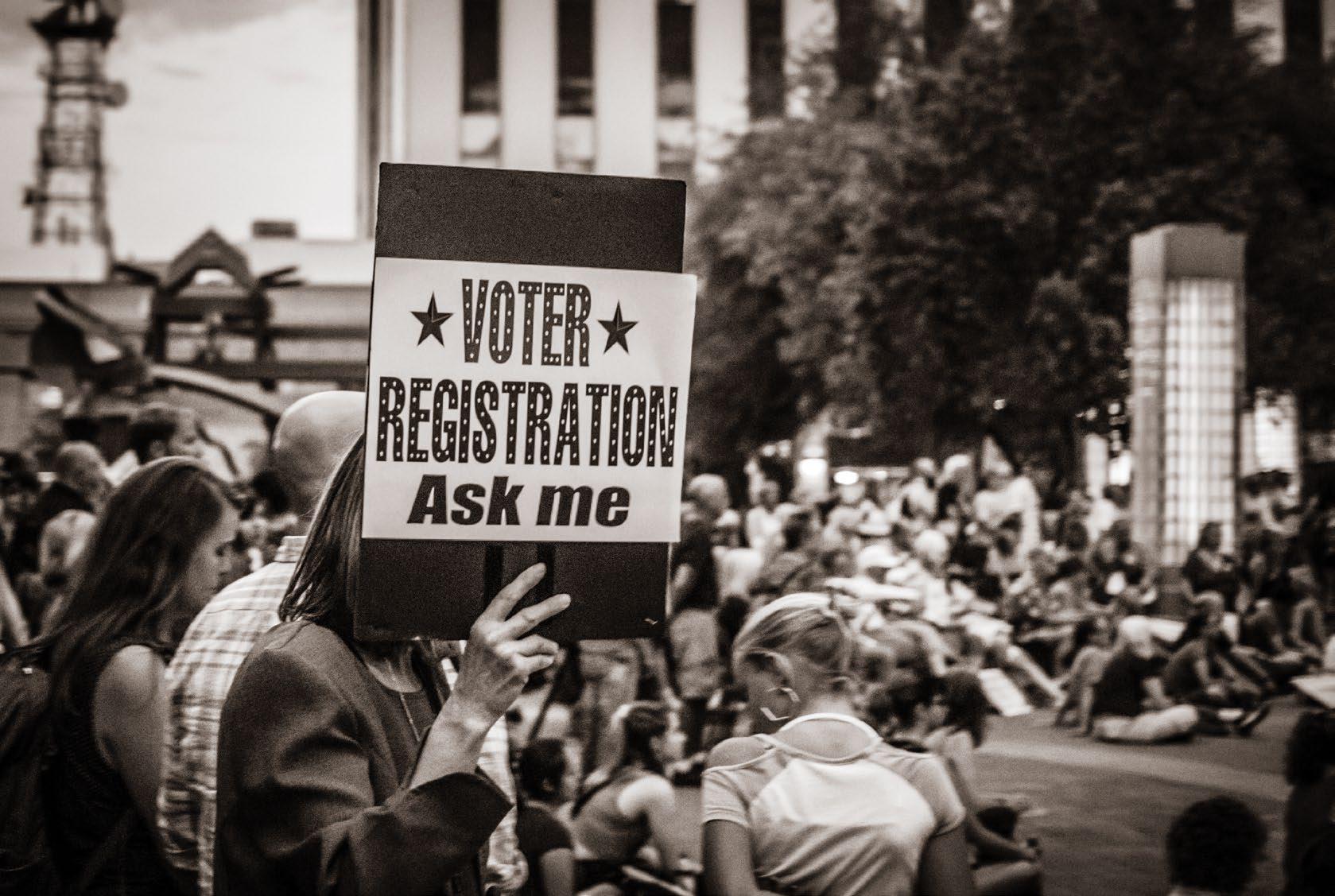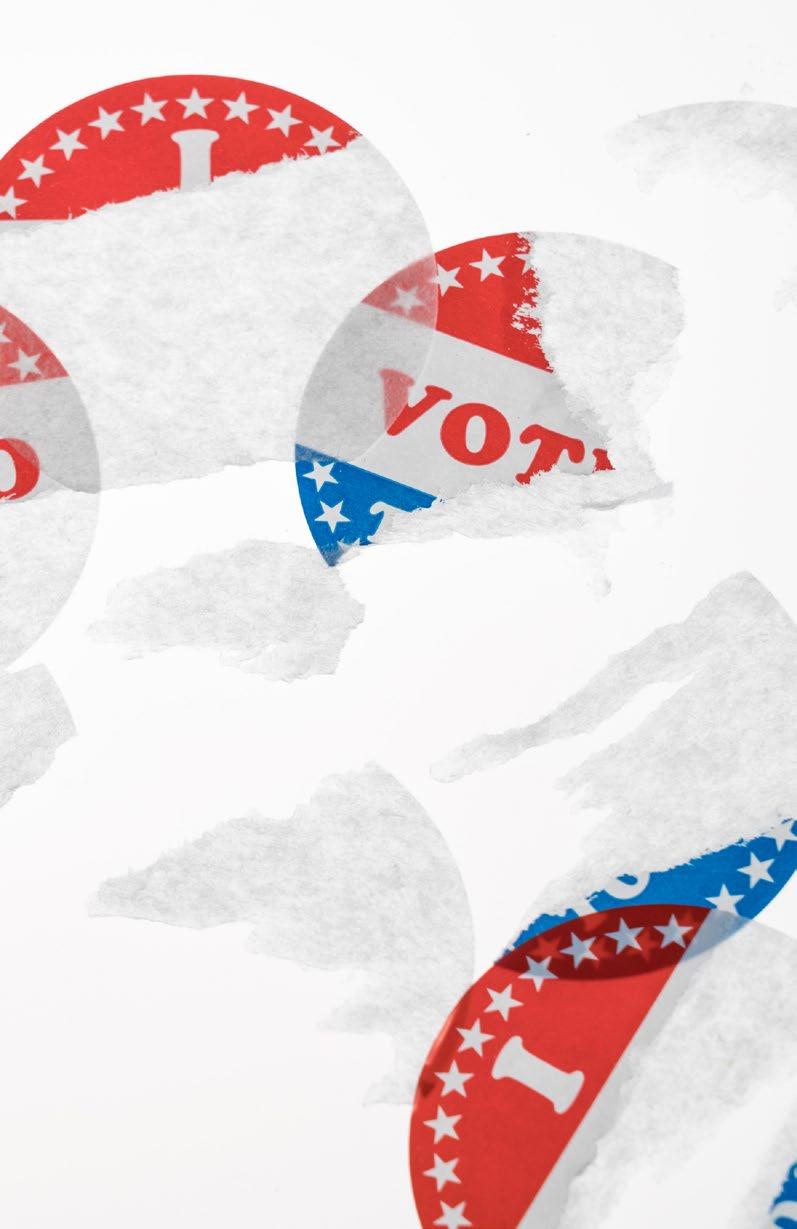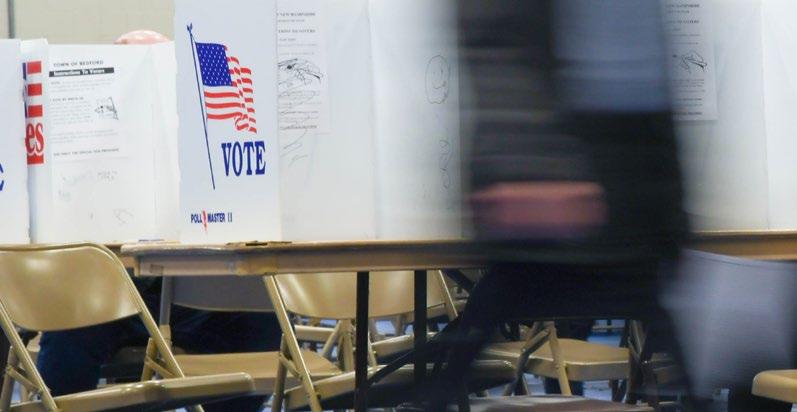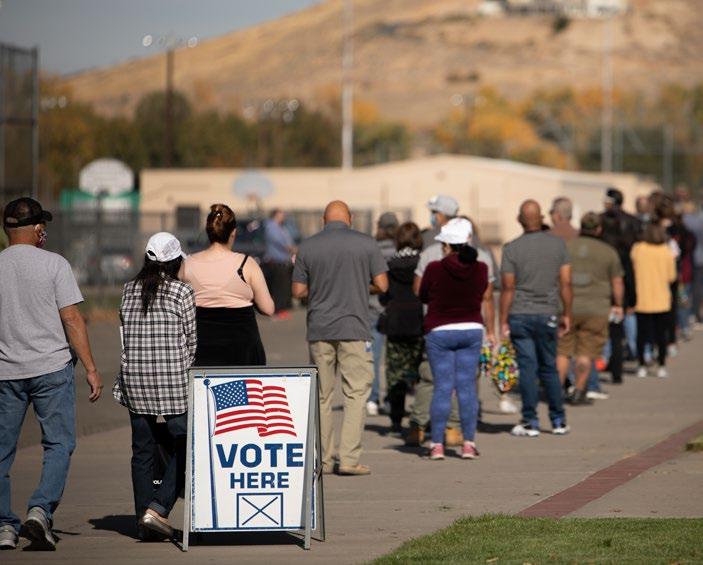




When a state or county conducts a program to systematically remove people from its list of registered voters, this is called “voter list maintenance.” When done properly, these programs can increase the accuracy of voter rolls by removing people who pass away, no longer live in the state, or have become ineligible for other reasons. However, overly aggressive removal of voters has also become a key strategy for politicians and political operatives trying to suppress the vote. These types of removals can disenfranchise eligible voters, are sometimes unlawful, and are commonly referred to as “voter purges.”
Wrongful voter purges undermine the right to vote and often target and disproportionately impact voters of color, low-income voters, and young people. In addition, wrongful purges can impact election results, especially in state and local elections decided by a small number of votes.
The challenge to combating wrongful purges is that many residents do not find out they were purged from the voter rolls until they are trying to cast their ballot. At that point, it can be too late to fix the problem.
Understand how and when Boards of Elections conduct voter list maintenance and update the voter rolls; Spot and get ahead of wrongful purges; and Report and fight unlawful purges.
If you suspect voters were wrongfully purged or find other evidence of suspicious purges, the Southern Coalition for Social Justice and its partners can help! You can report problems, share info, or submit questions in three ways:
Fill out the SCSJ Voter Purge Intake Form; OR Email voterlists@scsj.org; OR
Call Hilary Klein, Senior Counsel for Voting Rights, Southern Coalition for Social Justice, at 919-323- 3380 ext. 919.

If you discover evidence that people may have been wrongly purged during Early Voting or on Election Day, please call the Election Protection Hotline at 1-888-OUR-VOTE.

While the focus of this toolkit is on wrongful purges, there are a few situations in which voters can legally be removed from the voter rolls. This is not a wrongful purge, just regular list maintenance.
The National Voter Registration Act (NVRA) is a federal law that limits when and why a state or county can remove someone from the voter rolls. The NVRA allows states and counties to remove a registered voter when:
• the voter has requested removal;
• the voter has died;
• the voter has moved out of the voting jurisdiction (i.e., to another county or state);
• the voter has a disqualifying criminal conviction or adjudication of mental incapacity that requires removal under state law; or
• the voter does not respond to an address confirmation notice from their election official and does not vote during the time period that includes the next two federal general elections.

systematically remove voters within 90 days of a federal primary; or
systematically remove voters within 90 days of a general election.
This 90-day prohibition on the systematic removal of voters includes actions that would be legal if conducted further out from the election, including: removing inactive voters; moving people to inactive status; or removing people based on large scale, third-party challenges to registered voters.
In North Carolina, voters who request removal, have died, are serving a sentence for a felony conviction, or have moved out of the jurisdiction and filed a Change of Address with the U.S. Postal Service are removed from the voter rolls on a rolling basis. In addition, in the odd years following statewide general elections (e.g., 2021, 2023), the State Board of Elections (NCSBE) oversees a “no-contact” list maintenance program where county Boards of Elections (CBEs) remove some “inactive” voters from the voter rolls.

There are two ways voters become “inactive” in North Carolina:
When a voter does not cast their ballot or otherwise have contact with their CBE during a period spanning two statewide elections, the CBE will send the voter a forwardable confirmation mailing. If the voter fails to respond to the mailing within 30 days, the voter will be placed on inactive status.
A voter can also be placed on inactive status if mail sent by the CBE is returned as undeliverable and the voter does not respond to a subsequent forwardable confirmation mailing within 30 days.
“Inactive” voters can still vote! But if they do not vote or have some other contact with their CBE during the period spanning two statewide general elections, they will be removed during the state’s biennial “no contact” list maintenance program, which generally happens in the first quarter of every odd year.
North Carolina is expected to become a member of the Electronic Registration Information Center (ERIC) in 2023, which will allow North Carolina to compare its list of registered voters with those of other states and identify individuals who may have moved and registered in their new state. Updates to North Carolina’s list maintenance process are expected in early 2023.
For more detailed information on how list maintenance works in North Carolina, see the Southern Coalition for Social Justice’s explainer, Understanding Voter Registration List Maintenance, and the NCSBE’s guidance document, Maintaining the Voter Registration Database in North Carolina

Here are some warning signs that a wrongful purge may be coming or may have already occurred.
Registered voters are being purged despite remaining eligible and living at the same address
If you learn a voter believes they were registered but may no longer be on the voter rolls, ask the voter to confirm their voter registration status on North Carolina’s Voter Search Tool. Make sure under “Voter Status” to click “Registered” and “Removed or Denied” to pull up accurate information. If the voter is classified as “Removed or Denied,” they may look up their county’s voter registration data to find out when their status changed.
If the voter does not show up as registered, more information maybe needed to figure out why the voter may have been removed or why their voter registration may not have been processed in the first place.
When, where, and how did they register to vote?
Sometimes people mistakenly believe they are registered to vote, but in fact their registration was not completed or processed.
When is the last time they voted?
Did the voter recently move or change their name?
If the voter moved or changed their name, the best next step is to tell them to re-register under their new address and/or name.
Is there someone who lives at their address, or who recently lived at their address, with a similar name (e.g., senior or junior)?
Sometimes it’s helpful to check the registration status of other household members in case the wrong person was removed.
Did the voter have a recent interaction with the criminal legal system?
Sometimes voters with criminal convictions are incorrectly flagged as ineligible to vote and wrongfully purged. You can get up-to-date information on who is eligible to vote with a criminal conviction in North Carolina on the State Board of Election’s website. Voters who were properly removed for a felony conviction need to re-register to vote when they become eligible again.

In North Carolina, a voter could have been wrongly removed if:
the voter lives at the same address since becoming registered to vote; they voted in at least one election or had some other contact1 with the County Board of Elections within the past 8 years while registered at that same address; they have no other potentially disqualifying reason for being purged, such as a felony conviction.
• Inflammatory statements by government officials and politicians claiming mass voter fraud can indicate a wrongful purge is coming. These include claims that the voter rolls need to be “cleaned up,” that dead people are still registered to vote, and that noncitizens and/or nonresidents are voting.
• Inflammatory statements and threats of litigation by national groups could signal a purge is coming. Groups like the American Civil Rights Union (ACRU), Judicial Watch, the Public Interest Legal Foundation (PILF), Honest Elections Project, and True the Vote have pursued claims of voter fraud to push for more aggressive purge practices across the country.
• Local critics and anti-democracy groups may be quietly or openly challenging voters and trying to force wrongful purges. If you know who these people are, it is helpful to learn if they are promoting work by national groups that have sought purges, and to keep track of recent statements they may have made about voter fraud, purges, or poll-watching.
1 A list of the types of contacts that confirm a voter’s registration address can be found on p. 6 of the NCSBE’s Guidance document, Maintaining the Voter Registration Database in North Carolina
• Suspicious Mail. If voters receive unexpected mail about elections or voter registration from someone other than their elected officials, this may signal the sender is trying to concoct evidence to support a voter purge. The sender may be looking for people whose mail is returned undeliverable so they can challenge those voters and get them removed from the voter rolls.
• Suspicious Door-Knocking. Across the country, including in North Carolina, anti-democracy groups are knocking on voters’ doors and asking people to confirm their identity and residence. Again, these groups may be using information or non-responses to challenge voter registrations and push for wrongful purges. If voters are contacted by an individual or group seeking to confirm their identity and/ or residence, let them know they are not required to provide this information to anyone other than an elections official. Please report any incidents using the contact information in this toolkit.
State and/or local BOEs will often send out notices to voters through the mail as part of regular list maintenance. These notices could be part of a lawful list maintenance program.
But the following notices may indicate a wrongful purge has happened or is about to happen:
• A notice that the voter’s eligibility has been challenged by another person.
• A notice confirming the voter’s address or registration status when there has been no change.
• A notice that the voter has been removed from the voting rolls.
• Notices of potential or impending removal from the voterrolls that are mailed within 90 days before a federal primaryor general election.

Here are ways to look for wrongful voter purges before they prevent people from voting.
Prioritize and promote early voting!
• The best way to get ahead of wrongful purges is to encourage voters to vote in person during North Carolina’s Early Voting Period. During Early Voting, which ends at 3 p.m. on the Saturday before Election Day, voters with registration issues can fix those issues or register for the first time and cast a ballot the same day. This is called “Same Day Voter Registration.”
• In North Carolina, Same Day Voter Registration is NOT available to voters on Election Day. It is therefore critical for voters to have a plan to vote during the Early Voting period so they can resolve any registration issues and cast a ballot that will be counted.
• In North Carolina, a voter can check their registration status any time using North Carolina’s Voter Search Tool.
• Encourage voters to check their registration status 4 months before the election, and again 6 weeks before the election.
• Consider incorporating a registration check into voter engagement work, including voter registration drives, GOTV, and other canvassing activities.
• Encourage voters flagged as “inactive” who live at the same address where they registered to contact their CBE to confirm their address and to vote in the next election.
• Consider targeted outreach to voters on North Carolina’s list of inactive voters, who are at risk for removal if they do not vote or have contact with their BOE. If you would like to coordinate with other groups who might also be reaching out to inactive voters, contact Hilary Klein, Senior Counsel for Voting Rights with the Southern Coalition for Social Justice, at 919-323-3380 ext. 919.
Set Google and other news alerts that include voter fraud topics (e.g., illegal voting, noncitizen voting, voter challenges, voter removal) and the names of government officials, politicians, and groups you know are pushing for aggressive purges or challenging voters.
Follow your local elections office, government officials, and anti-democracy activists on twitter and other social media platforms to keep track of what they are saying and doing.
If you or your organization meet regularly with local elections officials, ask them if they are receiving voter challenges or requests for more aggressive purging from third parties.

If you find patterns of voters who should not have been removed or other evidence of suspicious purge activity, the Southern Coalition for Social Justice and their partners can help investigate the problem and stop wrongful purges. There are three ways to reach us:
Fill out the SCSJ Voter Purge Intake Form; OR
Email voterlists@scsj.org; OR
Call Hilary Klein, Senior Counsel for Voting Rights, Southern Coalition for Social Justice, at 919-323-3380 ext. 919.

If you discover evidence that people may have been wrongly purged during Early Voting or on Election Day, please call the Election Protection Hotline at 1-888-OUR-VOTE.
If you suspect a wrongful purge may have occurred, be careful to verify the suspicions before publicizing. It may be helpful to refer to the “warning signs” above or reach out to the Southern Coalition for Social Justice, using the contact information in this toolkit. Talk of purge activity could unnecessarily alarm voters or deter people from voting.
The Southern Coalition for Social Justice, Demos, and other voter protection groups are always looking to learn as much as possible about purge activity, even if the purge is valid. Whatever you learn about the timing and process for purges, lists of purged voters, or bad actors who might be pushing for aggressive voter purges is helpful! There are three ways to reach us:
Fill out the SCSJ Voter Purge Intake Form; OR
Email voterlists@scsj.org; OR
Call Hilary Klein, Senior Counsel for Voting Rights, Southern Coalition for Social Justice, at 919-323-3380 ext. 919.

Demos founded the Voter Purge Table to bring together national and local groups on the lookout for wrongful purges. Joining the Voter Purge Table is a great way to keep up on the latest purge news and get realtime help with questions and issues when they arise. To learn more about the Voter Purge Table, email voting@demos.org.

The Southern Coalition for Social Justice, founded in 2007, partners with communities of color and economically disadvantaged communities in the South to defend and advance their political, social, and economic rights through the combination of legal advocacy, research, organizing, and communications. Learn more at southerncoalition.org and follow our work on Twitter, Facebook , and Instagram
Media Contact Media@scsj.org
We power the movement for a just, inclusive, multiracial democracy and economy. Dēmos is a racial justice movement-connected think tank that advances a comprehensive agenda to build community power.
We achieve this by collaborating with movement leaders to shift and change oppressive systems and create the conditions for an inclusive economy and democracy.